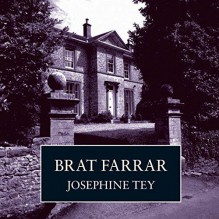
Today I’ve been reading Josephine Tey’s “Brat Farrar”, a mystery novel, published in 1949, about a young man who pretends to be the assumed-to-be-dead heir to a minor English estate.
The thing that strikes me most about it is the distinctive flavour of Tey’s English. Listening to it is like travelling in time. The words are, for the most part, unchanged from current usage but the rhythms of the prose, the expectations the writer has of the reader’s attention span and the taken-for-granted use of complex sentence structures, speak of a time when clothes were tailored, food was prepared by servants and education was what demonstrated that you were one of us. This is language as time travel.
Take a look at the start of Chapter Four, where we first get inside the head of our main character (Yes, we spend three chapters without knowing who the main character is or what his thoughts are. The first half of chapter one is spent describing a family breakfast at which Brat Farrar is neither present nor mentioned). Let yourself savour the way Tey brings Brat into focus:
“The boy lay on his bed in the dark, fully dressed, and stared at the ceiling.
There were no street lamps outside to illuminate this back room under the slates; but the faint haze of light that hangs over London at night, emanation from a million arcs and gas-lights and paraffin lamps, shone ghost-like on the ceiling so that its cracks and stains showed like a world map.
The boy was looking at a map of the world too, but it was not on the ceiling. He was examining his odyssey; conducting a private inventory. That meeting to-day had shaken him. Somewhere, it seemed, there was another fellow so like him that for a moment they could be mistaken for each other. To one who had been very much alone all his life that was an amazing thought.”
This is a world away from those frantic thrillers that must start with a blood-soaked prologue to reassure the reader that this is a book with action in it and then dive straight into a stream-of-barely-consciousness that immerses us in the trivia that flows through the mind of either hero or villain.
This is a world where the author has a story to tell and you, by virtue of having opened the book, have volunteered to follow the path the author has set out for you, as if she were your guide to an ancient city, in the firm expectation that she knows where she’s going.
In the second paragraph, she deftly leads you into the room, as if you were riding a photon generated by one of those London street lamps and establishes a sense of place.
In the third paragraph, she helps you slip into Brat’s interior landscape, letting you know that this too she will help you navigate.
At this point, I felt myself relax. This is not a novel in which the writer is playing Find The Lady with my curiosity. It is a story where all I have to do is follow in the writer’s footsteps and all will be shown to me.
The difference between this and a modern novel is not just one of structure or even intent. It is a difference that comes from the fluidity of English itself.
We no longer talk or think the way Tey and the people in her world talked or thought. They are our distant cousins, using a dialect that we understand but which, in subtle ways, we find ourselves translating.
Perhaps I’m more sensitive to the malleability of English than usual at the moment. Having just returned to England after an absence of sixteen years, in which I spent most of my time working with people for whom English was a second language, I find that my version of English has mutated to the point where, if it were a mammal, its ability to mate with the local species of English would be in doubt.
My “native English”, dating from when I last lived here, is archaic and, along the way. I have acquired a tendency to use phrases that are more French or German than English: “We have the possibility to…” “We have, since many years, been…” “I am coming to understand that…”
The language spoken locally seems effortless vibrant and endlessly flexible by comparison. Few here speak an English they’ve been taught or even think consciously about how they say what they say. The result is an outpouring of the here and now that is only truly to be comprehended by those who are here and now.
So Josephine Tey has taught me that: language is time travel, that I can only understand other times “in translation” with a lag of meaning and a loss of nuance and that no one can step into the same river of language twice.
On the whole, I find that quite exciting.


 Log in with Facebook
Log in with Facebook 











